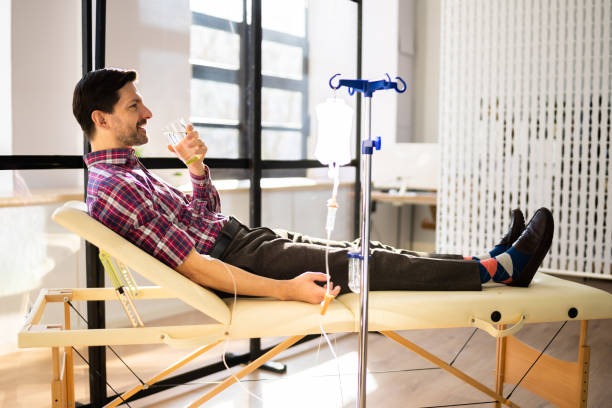Key Takeaways
- IV hydration therapy is a practical, modern option for rapid hangover recovery, bringing medical care to your doorstep.
- Fast absorption of fluids and electrolytes through IV drips can offer more immediate relief than oral remedies.
- Scientific studies support IV methods, but healthy adults should weigh both the benefits and the considerations for safety.
- The growing popularity of IV hydration reflects changing attitudes toward wellness, convenience, and proactive self-care.
What Is IV Hydration Therapy?
Waking up after a night of celebration often comes at a price. The sluggishness and dehydration associated with a hangover can derail even the best-laid plans for the next day. In recent years, IV hydration therapy has emerged as a sought-after remedy for those seeking swift recovery. Intravenous (IV) hydration involves administering a carefully balanced solution of fluids, electrolytes, and sometimes vitamins, directly into your bloodstream via a vein. The difference between sipping water and receiving an IV infusion is speed and efficiency—the treatment bypasses the digestive system entirely, allowing the body to absorb nutrients and fluids much faster.
What makes this treatment even more appealing in our busy world is the rise of services that offer a hangover IV mobile hydration service. Instead of dragging yourself out of bed to a clinic or emergency room, qualified professionals can come to your home, hotel, or office. Clients often report that this level of care is convenient and allows them to start feeling better in the comfort of their own surroundings. As personalized health care options grow, IV hydration continues to gain traction for its practical approach to overcoming common hangover woes.
Why Hangover Symptoms Can Be So Tough
Alcohol’s effects on the human body go far beyond a momentary buzz. After the celebrations end, the body begins processing alcohol through the liver, releasing enzymes that break it down into acetaldehyde, a compound notably more toxic than alcohol itself. The classic hangover symptoms—headache, dry mouth, nausea, grogginess, and light sensitivity—are all interconnected with dehydration and loss of vital nutrients. Alcohol acts as a diuretic, meaning it pushes the body to lose more fluids through increased urination, leading quickly to dehydration.
This dehydration does more than leave you thirsty; it disrupts the delicate balance of sodium, potassium, and other electrolytes needed for optimal nerve and muscle function. According to data from health authorities, including the Mayo Clinic, the intensity of hangover symptoms often corresponds directly to the degree of fluid and electrolyte loss. As a result, simply drinking water might not be enough, especially when vomiting or gastrointestinal upset limits your ability to rehydrate the usual way. Hangovers are a clear indicator that the body needs support to restore equilibrium.
How IV Hydration Intervenes In Recovery
The compelling advantage of IV hydration lies in its immediacy. By delivering fluids straight into the bloodstream, rehydration is not delayed by digestion or absorption barriers in the gut—a significant benefit for anyone experiencing nausea or vomiting. Several medical experts highlight that intravenous rehydration is the standard of care for severe dehydration in hospitals because it works quickly and efficiently. As demonstrated in a WebMD analysis, patients often report noticeable symptom relief—such as reduced headache and improved clarity—within 30 to 60 minutes of starting an IV session.
IV infusions for hangover recovery often include more than saline. Many formulations provide essential vitamins (including B-complex and vitamin C), muscle-relieving magnesium, and powerful antioxidants like glutathione. These additions support your body in metabolizing acetaldehyde, boosting immune function, and accelerating the cellular repair needed after heavy drinking. The rapid delivery and tailored nutrient support set intravenous hydration apart from any oral solution.
What Goes Into An IV Drip For Hangovers?
Hangover IV drips are more than just saltwater in a bag; they’re carefully designed mixes to attack different symptoms simultaneously. Here’s what you’ll often find:
- Normal saline or Lactated Ringer’s Solution: Acts as a base fluid to rapidly restore lost volume and help balance electrolytes.
- B-Complex Vitamins: Alcohol depletes these nutrients, so infusing them helps support brain function and energy production.
- Magnesium: Known for easing cramps and fatigue, it benefits those suffering from alcohol-induced muscle pains.
- Antioxidants (glutathione, vitamin C): Help the liver break down toxins and minimize cellular stress caused by alcohol.
- Medications, if necessary: Sometimes, anti-nausea or anti-inflammatory drugs can be added, but only under medical supervision.
Many IV hydration providers allow these infusions to be tailored to individual needs, with the precise combination adjusted based on symptoms and health history. This customization is why many people find IV hydration more appealing than generic energy drinks or supplement tablets.
Is IV Hydration Safe? What Experts Suggest
Safety is a primary concern with any medical procedure, and IV therapy is no different. In a feature by NBC News, health professionals note that the risk for complications is generally low for individuals in good health, provided the service is performed by trained clinicians and with proper sanitary precautions. Providers should take a thorough health history to screen for allergies, underlying kidney or heart problems, or other medical conditions that may increase the risk of side effects. Some mild reactions are possible, like temporary bruising or discomfort at the injection site. However, significant issues are rare when experienced healthcare professionals administer IV therapies.
It’s also important to remember that IV hydration isn’t a substitute for responsible alcohol use or medical evaluation when severe symptoms occur. While it’s tempting to view IV therapy as a quick fix, it should be part of a larger toolkit for wellness and hangover prevention. As with any health intervention, potential patients are encouraged to research providers and ask about safety standards before treatment.
Comparing At-Home Remedies and IV Hydration
For decades, most people have turned to tried-and-true home hangover remedies: rehydrating with water, consuming sports drinks to replace lost electrolytes, eating a hearty breakfast, and catching up on rest. These methods certainly have value, especially for those with mild symptoms or a low risk of dehydration. For many, a greasy meal is as much a comfort ritual as a remedy. But oral hydration and food intake require time to be absorbed and processed, and can prove challenging when nausea is in the mix.
IV hydration offers a significant advantage here. With its ability to bypass the digestive system, relief is often felt much sooner, which can be crucial if you have work, family, or social obligations pressing. While at-home strategies are practical and inexpensive, IV hydration is increasingly viewed as a tool for those needing a faster, more thorough recovery without the wait. Of course, combining both approaches—such as following IV therapy with a balanced meal and additional fluids—can be even more synergistic.
Who Should Consider IV Therapy For Hangovers?
IV hydration therapy for hangovers isn’t ideal for everyone. Those who are generally healthy, experience moderate-to-severe symptoms, and need a rapid return to normal activities may benefit most. People with specific health conditions—such as chronic heart failure, kidney disease, or known allergies to IV components—should avoid elective IV treatments or seek a thorough medical consultation before proceeding. Individuals anxious about needles or medical procedures should also weigh their comfort level against potential benefits.
Frequent drinkers should take care: while IV hydration can mitigate symptoms, it doesn’t protect against the underlying risks of excessive alcohol use. It’s always best to use this therapy as an occasional support rather than a regular crutch. Consulting a healthcare provider can help determine if IV therapy is appropriate and safe for your unique needs, especially if unusual or severe symptoms persist.
Trends, Accessibility, and The Future of Hangover Recovery
The wellness movement has changed expectations about health recovery, and IV hydration is riding that wave. Whether administered at festivals, bachelor parties, workplace retreats, or as a proactive part of self-care, these services are becoming more readily available to everyday consumers. Technology and telehealth innovations will likely expand the reach and safety of hangover relief in the future, making it potentially more mainstream and regulated.
Embracing moderation, listening to your body, and preventing dehydration before drinking remain the foundation of good health. For those situations when prevention isn’t enough, turning to a reputable hangover IV mobile hydration service can provide a convenient and effective route back to wellness. As consumer expectations for time-saving, personalized care continue to evolve, the role of IV hydration in hangover recovery is poised to grow, offering new possibilities for fast and tailored relief.



